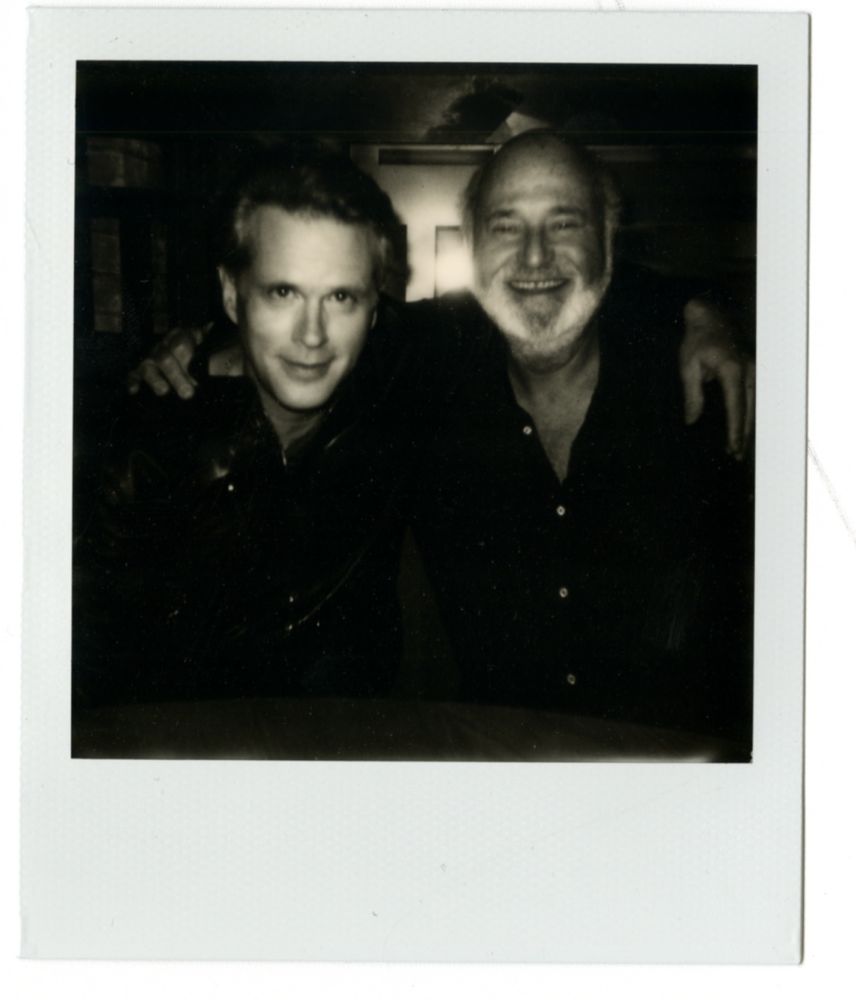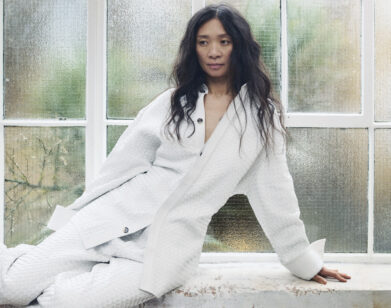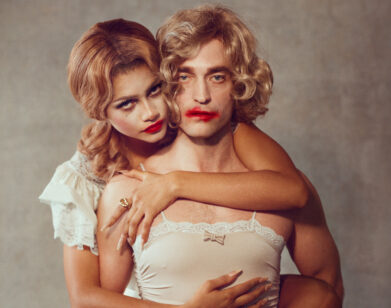Cary Elwes and Rob Reiner’s Toronto Reunion

ABOVE: CARY ELWES (LEFT) AND ROB REINER IN TORONTO, SEPTEMBER 2015.
For Oscar-winning director, writer, and actor Rob Reiner, Being Charlie is an extremely personal film. Co-written by Reiner’s son Nick and Matt Elisofon, the film follows a well-to-do Los Angeles 18-year-old (Nick Robinson) as he struggles with drug addiction, rehab, and his family’s reaction to his self-destruction. It’s no secret that Charlie’s strained relationship with his father, an actor-turned-politician played by Cary Elwes, is inspired by Nick and Rob Reiner’s own relationship, or that Charlie’s addiction is based on what Nick went through as a teenager. “Working on this has been the most intense, emotional thing I’ve ever been through,” explains Reiner. “It was like being in therapy for a year without a therapist there.”
Yesterday, which also happened to be Nick Reiner’s 22nd birthday, Being Charlie premiered at the Toronto International Film Festival. Both Reiner and Elwes were on hand to discuss the film. During their time in Toronto, the two old friends also participated in Jason Reitman‘s live reading of Reiner’s 1986 hit The Princess Bride.
EMMA BROWN: You’ve known each other since The Princess Bride. Was there a period of time when you didn’t keep in touch?
CARY ELWES: No.
ROB REINER: I don’t think so.
BROWN: Why did it take you so long to collaborate again?
REINER: Because I was a fool.
ELWES: [laughs]
REINER: You’ve got to find the right project and the right part. For this particular film, it’s so personal. I knew Cary could play the part just because it’s about a guy who was a movie star who is going to become a governor. I knew he could fit that bill, but I wanted to make sure I was with somebody that I could feel comfortable with and that I could trust. That was why I wanted Cary for it.
ELWES: It wasn’t for a lack of trying on my part. I would hassle him all the time. Every time he got a new script, my agent would go, “Here’s Rob’s new script, do you want to read it?” and I’d say, “Yes, please.” I’d go through and I’d try to find a part. I’d call him up: “Rob, you know that doctor role? I think I could do that.” He was so sweet about it—he’d go “Cary, you know I love you, but that’s not the right role.” He’s very meticulous. He’s used [casting director] Jane [Jenkins] for everything, but for the most part he casts the movies. He knows exactly who’s right for what role. So, I tried over the years, and then my wife said to me, “You’ve got to stop bothering him. He’s never going to give you a role if you over-bother the guy.”
REINER: [laughs] That wasn’t why! I’ve always wanted to find just the right thing.
ELWES: I didn’t know that. I was just thinking, “Gosh, it’s never going to happen.” I think Bucket List (2007) was the last time I called him. My wife said, “That’s it. No more calling him.”
REINER: You were not going to be right for Bucket List, that’s two 70-year old guys!
ELWES: [laughs] The doctor, the doctor!
REINER: That’s a nothing part, that’s not a part.
ELWES: I didn’t care—a chance to be with you again. I so love working with this man. He’s such a joy to work with. You ask any actors that have worked with him, they’ll tell you the same thing. He creates an environment that’s so conducive to creativity by just making everybody feel relaxed. It’s very rare that you have that kind of environment on a set. He’s been doing it so long now it’s second nature to him.
REINER: I like to have a good experience. That’s all you have. You watch a movie you’ve made if it comes up on television or something and it’s like a home movie: “Oh, yeah. Remember that day? The day you went and broke your foot in the thing.” The experience you have making the movie is all you have; when the movie’s finished, that’s for other people. But while you’re doing it, that’s your time on the planet, so you want it to be good.
BROWN: Did you have to learn that through experience?
REINER: I learned it. The things that you know intellectually when you’re young become internalized as you get older. You realize all those clichés like, “spend time with your family,” “your family is the most important,” turn out to be true. You start really understanding it and feeling it. Did you see the Amy Winehouse documentary [Amy, 2015]?
BROWN: Yes.
REINER: In the Amy Winehouse documentary, there’s a moment where she’s with Tony Bennett. They’re going to do a duet, and Tony Bennett says to her, “Life will teach you how to live, if you live long enough.” I thought, “Wow.” And poor girl, she didn’t learn how to live because she didn’t live long enough. Life will teach you, but you have to live long enough to get those lessons.
ELWES: You have to be present and aware.
BROWN: How did you find Nick Robinson, who plays Charlie?
REINER: Nick Robinson, I had seen in The Kings of Summer. We brought him in and he read with Devon Bostick. The two of them seemed like they had known each other for years—there was great, great chemistry. I haven’t seen Jurassic World. It’s not my kind of movie. I’ve seen clips of him in it: “Oh! Watch out! Watch out! Run!”
BROWN: I was reading the press notes and it said that Matt, who co-wrote the script with your son Nick, was a bit worried after the first table read because he felt it was sort of flat.
REINER: That’s what happens. It’s not the movie. Everybody’s trying to find their way. They’re fumbling around and they’re not going to do it exactly how it’s going to be. You get this kind of weird feeling of, “That’s it?” I just did it with LBJ; we had a reading with all the actors. We had some great actors there—Richard Jenkins and Woody Harrelson. They did a great job, but not anywhere close to what it’s going to be when you see the movie. It was Matt’s first experience, so he was like, “Uh oh.” I said, “No, no, no. It’s going to be good. It’s all there.”
BROWN: I know Matt and Nick went through several drafts before you cast the film. Did you do any rewrites while you were filming?
REINER: Yes. We kept doing it as we were working. This film was reflecting my relationship with Nick and his relationship with me in the character that Cary plays and Nick Robinson plays. As we’d work through our issues, we’d try to make sure that the script would reflect that. The last scene of the movie with Cary and Nick Robinson, it’s this moment where the father and son are able to talk. We shot it at the end of the movie. We kept re-working it right up till the end. We changed it a hundred times because as our relationship got better and changed, we wanted the scene to reflect that.
BROWN: Did you explain how personal the film was to Cary when you approached him?
REINER: Yeah, I did. That’s why I felt comfortable with Cary. I feel I can trust him. You want somebody that has your interests at heart. I have to make sure he’s okay and that he feels comfortable—if he’s going to do this work, that he feels good about it. That was a no-brainer for me. I’m glad that he wanted to do it. When you send a script to somebody, you don’t know.
ELWES: He had me with, “Hey, Cary.” I feel very proud and honored to be a part of it because of that. Just the very nature of that —that they chose to share their story with the world—was incredibly courageous; it’s never been done before. This is a new arena for all of us.
REINER: Plus, I wanted to have somebody playing the father that was a lot handsomer than me.
ELWES: He said to me in the beginning, “Look, you’re not playing me and I don’t want Robinson to play Nick. I want these to be characters so that you guys can live through these characters and have it be reflective of what we went through as a family, but not directly representative of us.” That gave us freedom to explore the characters in different ways. I’ve been looking to work with him for 29 years.
REINER: [laughs] We’re going to do it before 29 years [next time]. I’d be mostly dead by then.
BROWN: You first met in Berlin, right?
REINER: That’s right. Cary was making another movie and I was trying to find somebody to play Westley [in The Princess Bride]. I saw tons and tons of actors and none of them had the exact look and could act and had a sense of humor. It’s a very odd mixture of things—it’s romantic, it’s adventurous, it’s slightly satirical. How do you find a guy who can do all those things? I had seen Cary in Lady Jane and I thought, “Well, he certainly fits the romantic part—he’s attractive and all that—he’s a good actor, but does he have a sense of humor?” He was in the middle of shooting. What movie were you shooting in Berlin?
ELWES: Maschenka. It was a Channel Four movie.
REINER: They said, “Well, he’s there and you can meet him.” This was right after Chernobyl. Andy Scheinman, my producing partner, and I flew to Berlin. We met Cary at an outdoors little café. Cary does great impressions—I think he did an impression of Bill Cosby. I thought, “This guy is really not what I thought, he’s as twisted as this whole project.” Andy, who’s totally paranoid, was wearing this suede jacket—very expensive—and when he got to the airport he took it off and threw it in the garbage. He thought he was bringing radiation, so he took it off. [laughs] But I knew when I met Cary that he was it. The weird thing is Cary, Robin Wright, and André the Giant were the only three people that I met that could play those parts. There were no backups; there was no second person who could do the part.
BROWN: Is that normal?
REINER: No, it’s not normal. Normally, there’s always more than one actor who can play a part. In this case, I couldn’t find anybody. First of all, Robin Wright is described as the most beautiful girl in all the land. I needed a young girl because I had already cast Cary who was 21 at the time. Robin was only 19 or 20. I needed to find a young girl that could do the British accent— I had this idea of doing it in this classical sense. She did a perfect British accent because her father is British, so that was in her ear. She was the only one that I could find.
ELWES: There were plenty of other actors that could have played David Mills [in Being Charlie], so I do feel privileged.
REINER: Yeah, there were other actors who could do that part, that’s true, but only one that I felt, “Okay, I can entrust this [to him]. I’m not going to worry. He’s not going to give me aggravation.”
BEING CHARLIE IS CURRENTLY SCREENING AT THE TORONTO INTERNATIONAL FILM FESTIVAL.






